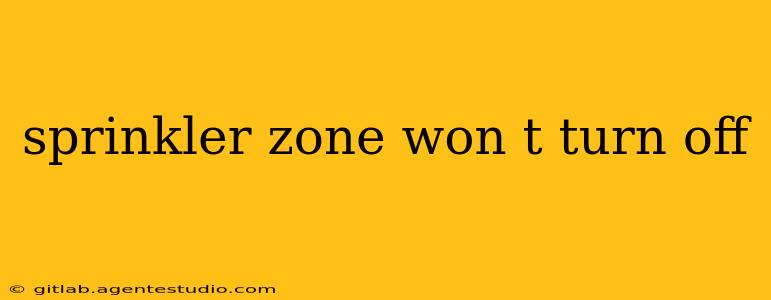A sprinkler zone that refuses to shut off is more than just an annoyance; it's a potential water waste disaster and a sign of a malfunctioning system. This comprehensive guide will walk you through troubleshooting common causes and providing effective solutions to get your sprinkler system back under control.
Identifying the Problem: Is it the Zone or the Controller?
Before diving into repairs, it's crucial to pinpoint the source of the problem. Is the issue isolated to a single zone, or are multiple zones malfunctioning? This helps determine whether the problem lies within the specific zone's wiring or valves, or if the central controller is the culprit.
Inspecting the Zone Valve:
The zone valve is the gatekeeper controlling water flow to each zone. A faulty valve is the most frequent cause of a perpetually running sprinkler zone. Here's what to check:
- Manual Override: Most zone valves have a manual override switch. Try manually turning the valve off. If this stops the water flow, the problem lies with the valve's solenoid or its electrical connection, not the controller.
- Solenoid Failure: The solenoid is an electromagnet that opens and closes the valve. A stuck or malfunctioning solenoid prevents the valve from shutting off. This often requires valve replacement.
- Valve Body Issues: Inspect the valve body for leaks, cracks, or debris that might be obstructing its operation. Sometimes, simple cleaning can resolve the issue.
- Electrical Connections: Carefully examine the wiring connections to the zone valve. Loose wires or corroded terminals are common causes of malfunction. Tighten connections or replace damaged wires.
Checking the Controller:
If the problem isn't the zone valve itself, the issue might reside in the sprinkler controller.
- Controller Programming: Double-check your controller's programming. Ensure the affected zone isn't accidentally set to run continuously or for an excessively long period.
- Power Supply: Verify that the controller is receiving adequate power. Check the circuit breaker or GFCI outlet supplying power to the controller. A power surge could have damaged the internal components.
- Internal Controller Malfunction: In some cases, the controller itself might be faulty. This usually necessitates professional repair or replacement.
Common Causes and Solutions:
Here’s a breakdown of common reasons why your sprinkler zone might be stuck "on," along with their respective fixes:
1. Stuck Solenoid:
- Problem: The solenoid in the zone valve is jammed open, continuously allowing water flow.
- Solution: Attempt to manually cycle the valve (if possible). If this doesn't work, the solenoid likely needs replacement. Replacing a zone valve is generally a DIY-friendly task, but if you are unsure, consult a professional.
2. Wiring Issues:
- Problem: Loose, corroded, or damaged wires connecting the controller to the valve.
- Solution: Carefully inspect all wiring. Tighten loose connections, replace corroded wires, and repair any damaged sections. Ensure all connections are securely fastened and properly insulated.
3. Low-Voltage Issues:
- Problem: Insufficient voltage reaching the zone valve. This is common with longer wire runs or poor connections.
- Solution: Check the voltage at the valve using a multimeter. If voltage is low, you may need to replace the wire run or address connection issues.
4. Water Pressure Problems:
- Problem: Extremely high water pressure can sometimes force a valve to stay open.
- Solution: Use a pressure regulator to lower the water pressure entering the sprinkler system.
5. Controller Malfunction:
- Problem: A problem within the controller itself may be sending a continuous signal to the zone valve.
- Solution: This often requires professional assistance or a controller replacement.
Preventing Future Issues:
Regular maintenance is key to preventing these problems:
- Annual System Inspection: Inspect your entire sprinkler system annually, checking valves, wiring, and the controller for signs of wear or damage.
- Winterization: Properly winterize your system to protect it from freezing temperatures that can damage components.
- Clean Valves Regularly: Periodically clean zone valves to remove debris that could obstruct their operation.
By systematically addressing these points, you should be able to diagnose and fix your persistently running sprinkler zone. Remember that safety is paramount – always turn off the main water supply before undertaking any repairs. If you're unsure about any aspect of the repair process, it's best to consult a qualified irrigation professional.

